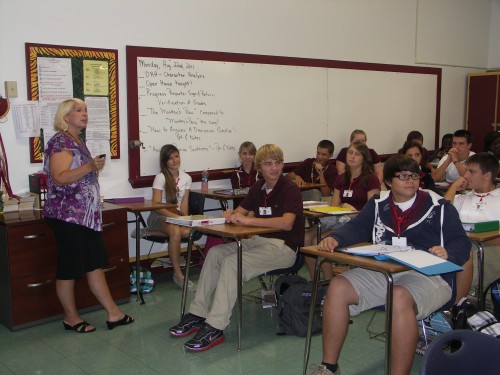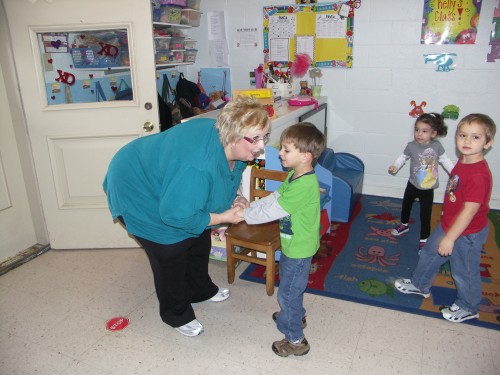
Classroom humor makes grade as teaching tool
February 28, 2012Crime Blotter: Reported Offenses in the Tri-parishes
February 28, 2012“Don’t call them a day care because they will be insulted,” warned Rev. Don Ross, pastor of the First United Methodist Church in Houma as he offered a tour of the Early Learning Center.
A staff of 50 full-time certified teachers and other staffers comprise this organization within an organization, and prepare 200 children from 6-week-old infants to 5-year-old kids for kindergarten by teaching life skills and basic academics.
Their plan is to develop the youngest of minds and personalities for what to them could be considered higher education. Beyond that the FUMC Early Learning Center helps children build a foundation for life.
Origins to Opportunity
The FUMC Early Learning Center got its start in 1977 as a Mother’s Day Out preschool program. From there the one-time traditional nursery to pre-kindergarten service evolved, grew and began adopting age appropriate learning programs so children would gain benefits from their time spent there.
In 1987, the FUMC Early Learning Center’s Director, Sue Peace, came on board. During what will soon be 25 years of her working with children at this location the program transformed from six teachers and about 50 children, into an organized educational model that is today recognized for its results by other pre-school institutions and even public school systems in the Tri-Parish region and the state.
Today, the school operates Monday through Friday with an extended day, which involves and early bird program that begins at 7 a.m. and the extended stay lasting until 5:30 p.m.
“You as a parent have an option of different programs [within the basic offerings],” Peace said. “You have the option of staying nine months or 12 months. Here you can go 9 a.m. until 1 p.m. You can come Monday, Wednesday, Friday. The younger ones can come on Tuesday, Thursday or Monday through Friday. We work it to the needs of the family.”
Lessons Offered
The instructional period, where children are in buildings and rooms divided by age and development levels, begins at 9 a.m. and continues until 1 p.m. When not in the classroom, students participate in extra-curricular activities including a computer lab, music therapy and other participation activities. “We don’t let them sit still,” Peace said with a laugh.
To those familiar with most pre-schools, Peace said it does not take long for them to recognize that this organization is run more like a private school.
At the infant center, a building separate to itself and referred to as the White House, teachers interact with the youngest of participants in developing eye and hand coordination, motor skills including leg and arm movement, rolling, setting, sign language and even walking.
The youngest 1-year-old students are introduced into social interaction and exploration. Older 1-year-olds are introduced to circle time where they learn days of the week, months of the year, shapes and colors. Children are taken outside in a gated and covered area for fresh air exercise and play.
Two-year-olds learn the role of the teacher and the student. “We don’t let them sit more than one minute because that is all a child that age needs to sit,” Peace said. “The curriculum we have includes Bright Beginnings, the Peabody Early Learning Kit, the Britannica Series, High Reach and Alphabet People.”
Three and 4-year-olds learn about people places and things in a classroom environment. They also have art and dance classes in which to participate.
Children on all levels are read to every day.
Between 1 p.m. and 3 p.m. is rest time. Peace said that parents who claim their children never take naps at home are often surprised that they will at school. “We have a full schedule,” the director said. “By 1 p.m. those that don’t sleep, fall to sleep.”
Qualified Credentials
As for teachers, each is academically qualified to work here just as they would be in any school setting. They are also required to participate in continued education programs. “All of them are state certified in early education development,” the director said.
Trained in early childhood development and expanding her own academics into employment law, Peace said she has no intention of becoming a lawyer, but finds that having that added training could help in her current work as an administrator.
“The [Houma-Terrebonne] Chamber of Commerce says we are one of the largest employers in Houma,” she said. “That is where [knowing employment law] will help.”
The FUMC Early Learning Center has an eye on becoming widely accredited by the National Association for the Education of Young Children but realizes that could be a challenge.
“It is difficult to get accreditation being in a church environment,” the director said. “For example everything has to be at eye level. If you have Jesus in the corner then you have to represent all religions. There are a lot of things that just makes it difficult for us.”
While waiting on an opportunity to be accredited in larger circles, the learning center is already accredited as a Louisiana Pathways Star Rated School and is the largest school of its kind in the Tri-parish region.
Peace said her consolation comes from having contacts in other schools. “I know a lot of the public school teachers and they will call me and ask if we have any that will be coming to their schools at Mulberry or Lisa Park,” she said. “Some of our children also go to the private schools like St. Francis, St. Gregory or St. Bernadette.”
Making Results
As for success stories shared by the director, one FUMC Early Learning Center graduate that Peace has followed over time entered into medical school this year. “She was in my class. The thing I remember most about her is that on the first day I have the children draw a picture of themselves. All the other children in her class were white and she was the only black. At the end of that year I had them all draw a picture of themselves and everybody was brown. They did not see color any longer.”
The FUMC Early Learning Center does not restrict its services to enrolled families. Following past hurricanes, Peace and the FUMC staff opened the church and school doors to people living at the Houma-Terrebonne Civic Center, which is directly across Little Bayou Black from the church. Children that had experienced trauma from storms and displacement were offered music therapy help by the learning center and responded in a positive manner.
“We have followed children born during the year of Hurricane Katrina [in 2005],” Peace said. “It is amazing how this little group had a difficult time with interaction. It wasn’t just our children. I checked and it was true everywhere around here.”
A music therapist focused attention on these children through their graduation from the learning center. Since then the center director has made calls to follow the children and their progress. “Now all of them are in second grade and doing beautifully,” Peace said.
“One of the things I appreciate about this program is that there are no rejects,” Ross said noting that the Early Learning Center has taken in children that were asked to leave other schools and transformed their behavior.
“That’s where our play coach comes in,” Peace said. “She works with the child. We work with them too. If they bite they will change.”
“Preschool is incredibly important to the future academic successfulness of a child,” Terrebonne Parish Superintendent Philip Martin said. “As time goes by I realize daily how important it is.”
The public school superintendent confirmed research that states that 52 percent of children in kindergarten are not ready for kindergarten. “They enter school behind the curve,” he said. “So then they are always behind and they cannot catch up, whereas if they have been in preschool it provides that opportunity to have learning experiences that other kids might not have.”
Cost Consideration
Tuition at the FUMC Early Learning Center varies based on services used and number of children enrolled with the same family. “At the White House [location for infants and 1-year-old children] all day every day is $560 a month,” Peace said. “The reason it is more over there is because we have a ratio of 4-to-1 in the infants. Also we have floaters [from age 1 up]. Each class on all age levels has a teaching assistant and a ratio of 3.5-to-1. You don’t get that anywhere else.”
Prices vary among older children depending on the program into which they are enrolled.
Meals are included for all children and are freshly prepared by cooks that attend classes to offer nutritional and balanced servings for the various children based on age development. “If we have macaroni and cheese we also have ham slices with pineapple, green beans,” the director said.
With a $1 million budget, Peace confirmed that much of it goes toward salary to insure keeping the best employees. “When I interview a potential employee, it is not so much the credentials I look at,” she said. “I have had people with master degrees that have not worked out. They had no relation with children. That’s because this is not a job you choose. It chooses you. Basically at the end of the day, the money goes back into the program.”
Education Mission
Ross said that he believes the Early Learning Center has grown because Peace and the other adults involved view their work as more than a job. While participants do not have to be members of the United Methodist Church, it is still the principals and traditions of this group that offer a foundation for educating others.
In addition to class and play, special activities include having brass ensembles perform during Louisiana Week, a snow day during winter when shaved ice snow is brought in and placed on the church lawn for the children to experience, Beignet Day where children are taught in French how to make beignets, and Crawfish Day. “The point is they are playing while learning,” Peace said.
Education and social action are nothing new to Methodists. The pastor and education director confirm that this school is part of their mission and even written proclamations.
“…[W]e support the development of school systems and innovative methods of education designed to assist every child toward complete fulfillment as an individual person of worth,” the Social Principles of the United Methodist Church 162.III.C reads.
“We use the entire property for the learning center,” Ross said. “They have special programs, and the kids put on shows so their parents can see what they have learned. There are an infinite number of enrichment experiences that happen here. It gives them a foundation in relationships so they are ready for life. That is the mission of the church. It is about relationships.”
Ross and Peace agreed that the No. 1 thing parents want for their children is a learning center. So that’s what they provide. Just don’t call them a day care.
First United Methodist Church Early Learning Center Director Sue Peace is greeted by student Jace Jarveaux and demonstrates how developing social skills among children prepares them for traditional school settings.













